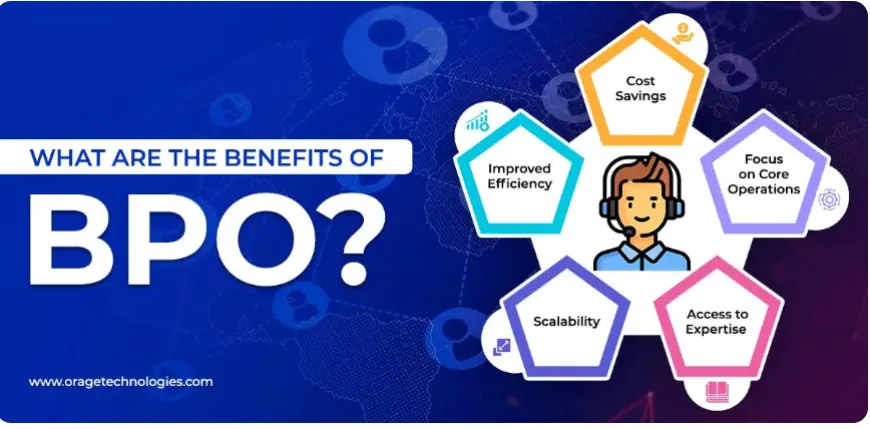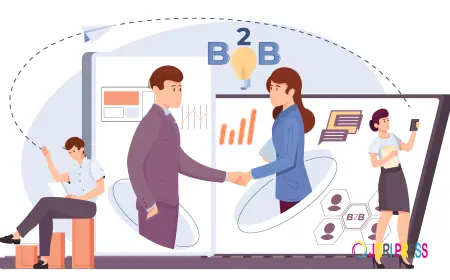What is BPO? An Overview of Business Process Outsourcing.
Discover the fundamentals of Business Process Outsourcing (BPO) with this detailed guide from Orage Technologies. Learn how BPO helps companies optimize operations, reduce costs, and improve efficiency. Understand the different types of BPO, including back-office and front-office services, and explore how outsourcing is transforming business strategies across industries.

As the business landscape evolves rapidly, companies are increasingly turning to outsourcing to handle various operational tasks. This strategic move is fueling the growth of a vital industry in the global economy—BPO. But what is BPO exactly? Why is it gaining popularity, and how does it benefit businesses?
This comprehensive guide breaks down what is BPO, the various types of BPO services, their functions, benefits, and real-life examples to help you better understand this dynamic industry.
What is BPO in Simple Words?
To put it simply, BPO stands for Business Process Outsourcing. It involves a business contracting another company to manage specific functions that are not part of its core operations. These tasks can range from customer service and data entry to payroll, accounting, and technical support.
Understanding what BPO is allows businesses to streamline operations and reduce expenses by outsourcing non-core functions to specialized service providers.
What is BPO Customer Service?
Customer support is one of the most widely outsourced functions under BPO. It involves helping customers before, during, and after their purchase journey. BPO providers offer support via multiple channels such as phone calls, email, live chat, social media, and SMS.
By outsourcing customer service, companies can enhance user satisfaction, retain clients, and strengthen their brand image. The impact of outsourcing becomes evident when you understand what BPO is and its role in customer care.
How Does BPO Work?
To truly grasp what is BPO, it’s essential to understand how it operates. BPO companies employ skilled professionals who take over designated business processes for client companies. These services are typically delivered remotely using advanced communication tools and software.
Common BPO Functions Include:
1. BPO Sales
These teams act as an extension of a business’s in-house sales department. They manage lead generation, follow-ups, and closing sales, all while helping to reduce hiring costs.
2. Lead Qualification
BPOs filter and validate potential leads through direct interactions, ensuring only quality leads are passed on to sales teams.
3. Quality Checks
Specialized teams monitor the quality of services delivered and ensure customer interactions meet the agreed standards.
4. Communication Management
BPO firms maintain continuous communication with their clients, providing real-time updates and performance insights.
To Know more: https://oragetechnologies.com/what-is-bpo/
BPO Job Roles: Telecaller Duties
Telecallers play an integral role in BPO operations. Their responsibilities include:
-
Outbound Calling – Reaching out to prospective customers for marketing or feedback purposes.
-
Inbound Support – Handling incoming calls related to queries, complaints, or service requests.
-
Customer Assistance – Resolving issues efficiently to improve the overall customer experience.
-
Sales and Promotion – Actively pitching products or services to boost conversions.
Recognizing what is BPO includes understanding the value of these roles, especially in customer engagement.
What are the Types of BPO Services?
There are three main categories that define what is BPO from an operational perspective:
1. Front-Office BPO
These services involve direct customer interaction. Common functions include customer support, technical assistance, and telesales.
2. Back-Office BPO
These are internal business operations like data entry, HR management, finance, and compliance that don’t involve direct customer contact.
3. Knowledge Process Outsourcing (KPO)
This type of BPO involves specialized knowledge-based tasks such as legal services, content writing, research, and data analytics.
Each type plays a vital role in business growth and helps define what is BPO in real-world scenarios.
What are the Benefits of BPO?
A full understanding of what is BPO includes the many advantages it brings to businesses:
1. Cost Savings
Outsourcing reduces the need for internal staff and infrastructure, helping companies save significantly.
2. Focus on Core Competencies
By offloading routine tasks, businesses can devote more time and resources to strategic areas like product innovation.
3. Expert Access
BPO providers employ specialists, allowing clients to benefit from professional services without direct hiring.
4. Scalability
Operations can be scaled up or down easily according to business needs, making BPO highly flexible.
5. Improved Efficiency
Delegating tasks to experts ensures better accuracy, faster processes, and fewer errors.
Examples of Business Process Outsourcing
Still unsure what BPO is in practice? Here are real-world examples of commonly outsourced services:
Customer Support
Telecom and e-commerce companies often outsource their customer support to provide 24/7 assistance.
Data Entry & Processing
Repetitive data tasks are outsourced for speed, accuracy, and efficiency.
Human Resources
Functions like payroll management, employee data handling, and recruitment are commonly outsourced.
Finance & Accounting
Bookkeeping, invoicing, tax preparation, and auditing are usually managed by BPO firms.
These examples highlight how knowing what BPO is can help businesses operate more smoothly and effectively.
Frequently Asked Questions
-
What is BPO in simple terms?
It refers to hiring an external service provider to manage non-core business operations in order to reduce costs and boost efficiency. -
Is BPO the same as a call center?
No. A call center is a part of BPO (specifically front-office), while BPO includes many more functions such as HR, finance, and IT. -
Is BPO a good job for freshers?
Yes, BPO jobs are great for freshers as they require minimal experience and offer learning opportunities. -
What qualification is needed for BPO?
Basic educational qualifications like high school or equivalent are often enough, though specific roles may need additional skills. -
What is the full form of BPO?
BPO stands for Business Process Outsourcing.
Now that you’re familiar with what is BPO, you can explore how it can benefit your business operations or shape your career path.
What's Your Reaction?
 Like
0
Like
0
 Dislike
0
Dislike
0
 Love
0
Love
0
 Funny
0
Funny
0
 Angry
0
Angry
0
 Sad
0
Sad
0
 Wow
0
Wow
0















































